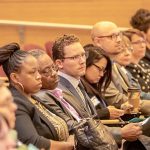“Principal preparation means getting staff ‘school-ready.’ While training programs often focus on knowledge, the University of Connecticut (UConn), with aid from The Wallace Foundation’s University Principal Preparation Initiative (UPPI), has found that practical leadership activities over time are equally important,” says Richard Gonzales, an associate professor in residence and director of educational leadership preparation programs at the Neag School.
In the months since Breonna Taylor and George Floyd were killed by police last spring, public outrage over anti-Black racism has inspired widespread protests, conversations and calls for reform. It is a movement with origins both recent and centuries old, and continues to spark in protest, as in the recent case of Jacob Blake, a black man shot by police in Kenosha, Wis. For students at the University of Connecticut, a new course will introduce them to the foundational history of systemic and anti-Black racism in the U.S. that underlies the current movement.
Historical monuments are intended to be timeless, but almost all have an expiration date. As society’s values shift, the legitimacy of monuments can and often does erode,” say Alan Marcus, a professor of curriculum and instruction at the Neag School, and Walter Woodward, an associate professor of history at UConn. “This is because monuments – whether statues, memorials or obelisks – reveal the values of the time in which they were created and advance the agendas of their creators.”
“We are building this course so that it is a starting point, not an ending point. We hope students coming out of this course will be interested in learning more and pursue opportunities available to them at UConn to learn from the phenomenal faculty teaching these modules as well as many other UConn faculty who focus on issues of racism, anti-Blackness, and other forms of oppression,” says Milagros Castillo-Montoya, an assistant professor of higher education and student affairs at the Neag School.
“Historical monuments are intended to be timeless, but almost all have an expiration date. As society’s values shift, the legitimacy of monuments can and often does erode,” say Alan Marcus, a professor of curriculum and instruction at the Neag School of Education, and Walter Woodward, an associate professor of history at UConn. “This is because monuments – whether statues, memorials or obelisks – reveal the values of the time in which they were created and advance the agendas of their creators.”
The good news is that significant research and data on how to effectively teach literacy already exist. In 2012, an initiative developed by the General Assembly’s Black and Puerto Rican Caucus studied best practices in early literacy and resulted in the “CT K-3 Literacy Initiative,” a pilot program with the UConn Neag School of Education that established school-wide improvement plans for reading and intensive interventions and provided ongoing literacy professional development.
Doug Glanville is a former Major League Baseball player, and has been an analyst for a variety of networks and publications. He’s the author of a book, “The Game From Where I Stand” and teaches at UConn. He’s also a member of the Connecticut Police Officer Standards and Training Council, and has been active in police reform efforts in the state after a widely-publicized incident where he was racially profiled in his own driveway.
This summer marks one year since the Neag School’s University of Connecticut Administrator Preparation Program (UCAPP) began implementing changes as part of a nationwide effort known as the University Principal Preparation Initiative (UPPI). In 2016, UConn was one of seven universities selected to join this initiative, funded by New York City-based Wallace Foundation, aimed at improving training for aspiring administrators.
Congratulations to our Neag School alumni, faculty, staff, and students on their continued accomplishments inside and outside the classroom.
The Education Project is excited to welcome two keynote speakers Basiyr Rodney, Ed.D. and Glenn Mitoma, Ph.D. who will both be further engaging with The Education Project’s main focus; educational disparities, equal access to technology, and social justice in education at our official launch event.




